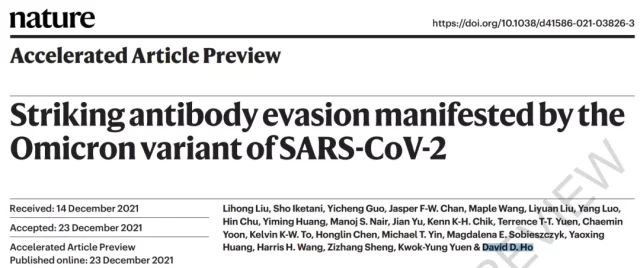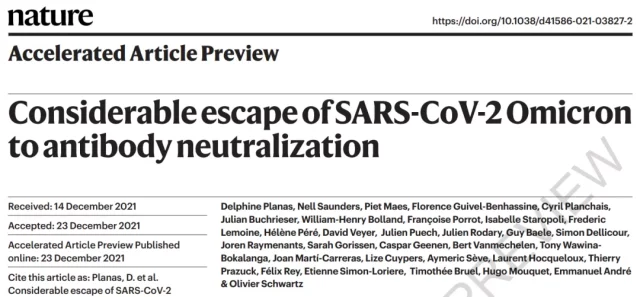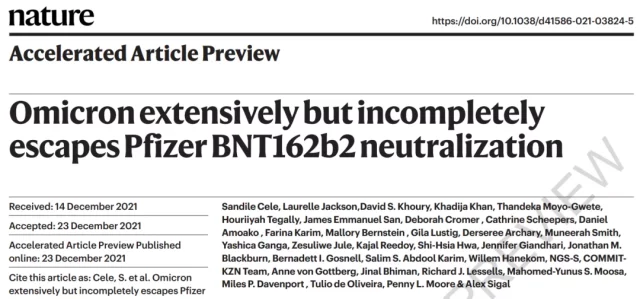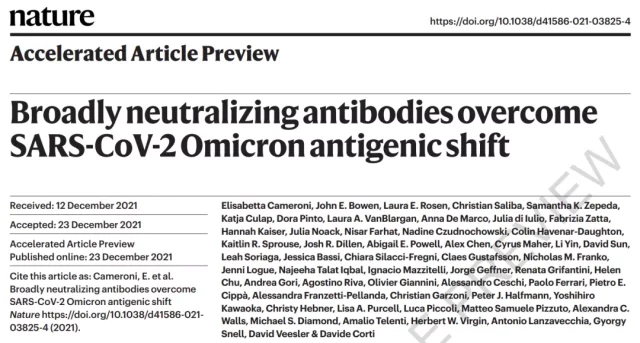Nature: Assessing the Escape of Omicron Mutants to Vaccines and Antibodies
- Normal Liver Cells Found to Promote Cancer Metastasis to the Liver
- Nearly 80% Complete Remission: Breakthrough in ADC Anti-Tumor Treatment
- Vaccination Against Common Diseases May Prevent Dementia!
- New Alzheimer’s Disease (AD) Diagnosis and Staging Criteria
- Breakthrough in Alzheimer’s Disease: New Nasal Spray Halts Cognitive Decline by Targeting Toxic Protein
- Can the Tap Water at the Paris Olympics be Drunk Directly?
Nature: Assessing the Escape of Omicron Mutants to Vaccines and Antibodies
- Should China be held legally responsible for the US’s $18 trillion COVID losses?
- CT Radiation Exposure Linked to Blood Cancer in Children and Adolescents
- FDA has mandated a top-level black box warning for all marketed CAR-T therapies
- Can people with high blood pressure eat peanuts?
- What is the difference between dopamine and dobutamine?
- How long can the patient live after heart stent surgery?
Nature: Assessing the Escape of Omicron Mutants to COVID-19 Vaccines and Antibodies.
November 26, 2021, World Health Organization (WHO) announced a new variant strains B.1.1.529 named ” Omicron “, tied for concern mutant (the Variant of Concern, VOC) , that is the highest risk level Of the new coronavirus variant.
In less than 4 weeks, Omicron infection has accounted for approximately 73% of the new coronavirus infections in the United States.
On December 23, Nature published 5 papers on the effectiveness of vaccines and antibodies against Omicron variants of the new coronavirus .
Existing new coronavirus vaccines and new coronavirus monoclonal antibodies (proteins that target and neutralize the new coronavirus) work by recognizing the spike protein (S protein) of the new coronavirus, which is also used by the new coronavirus to enter human cells Location.
The Omicron variant has about 32 mutations in the spike protein and is expected to soon replace the currently popular Delta lineage.
However, Omicron’s impact on the effectiveness of existing therapies and vaccines is still unclear.
The new coronavirus Omicron variant exhibits surprising antibody escape

Columbia University David Ho and his colleagues report that COVID-19 vaccines and treatments are much less effective for Omicron.
The author investigated four major COVID-19 pneumonia vaccines – Pfizer-BioNTech’s mRNA vaccine, Moderna’s mRNA vaccine, Johnson & Johnson vaccine, and AstraZeneca vaccine – neutralizing Omicron in samples from 54 participants Active, these 54 participants were vaccinated with two complete doses of vaccines (15 of them were also vaccinated with Pfizer-BioNTech’s mRNA vaccine and Moderna’s mRNA vaccine booster) .
A significant decrease in the effectiveness of anti-Omicron has been observed in all vaccine types , including two participants who have been infected with the new coronavirus.
However, in Pfizer-BioNTech’s mRNA vaccine or Moderna’s mRNA vaccine booster samples, the reduction in antibody neutralization rate is small .
The author also studied the neutralizing activity of 19 monoclonal antibodies against the mutant spike protein of Omicron. The monoclonal antibodies involved in the test include clinically approved therapeutic antibodies, such as REGN10987 (imdevimab) , REGN10933 (casirivimab) , COV2-2196 (tixagevimab) , COV2-2130 (cilgavimab) , LY-CoV555 (bamlanivimab) , CB6 (etesevimab) ) , Brii-196 (amubarvimab) , Brii-198 (romlusevimab) and S309 (sotrovimab) .
The results showed that 17 of the 19 monoclonal antibodies completely or partially lost their neutralizing ability . Only romlusevimab and sotrovimab retained their neutralizing activity.
The author also reported four new mutations (S371L, N440K, G446S and Q493R) of the Omicron spike protein . These mutations give Omicron stronger antibody resistance than other new coronavirus variants.
Paper link :
https://www.nature.com/articles/d41586-021-03826-3
There are a large number of escapes in the neutralization effect of the new coronavirus Omicron variants on antibodies

Olivier Schwartz of the Pasteur Institute in France and colleagues isolated an Omicron virus from an individual in Belgium, and analyzed how much the virus is for 9 monoclonal antibodies that are currently approved for clinical use or are still in development sensitive.
It was found that the Omicron mutant strain can completely or partially resist the neutralizing effect of all monoclonal antibodies in the experiment .
Among them, 5 kinds of antibodies (Bamlanivimab, Etesevimab, Casirivimab, Imdevimab and Regdanvimab) are not effective against Omicron ; 2 antibodies (Cilgavimab and Andintrevimab) have a lower neutralizing activity against Omicron than their activity against delta. 20 times; Sotrovimab’s anti-Omicron activity is about 3 times lower than its anti-delta activity.
In the serum collected five months after the second injection of Pfizer-BioNTech’s mRNA vaccine (16 people) or AstraZeneca vaccine (18 people) , no antiviral activity against Omicron was detected .
From the serum samples collected from 20 Pfizer-BioNTech mRNA vaccine third-injectors, the authors found that the neutralizing activity of Omicron increased by 6 times. In the serum of 40 recovered individuals (with a history of infection) collected 6 or 12 months after the onset of symptoms, the neutralizing activity of Omicron was either very low or not. However, among these recovered individuals, 22 people who received a shot of Pfizer-BioNTech’s mRNA vaccine had a higher neutralizing activity in their bodies than those who had received two shots of vaccine without a history of infection.
These preliminary analyses are all based on sera from vaccinators or those who have recovered from infection, but the authors point out that the sample size of these sera is relatively small, and they only analyzed two vaccines, Pfizer-Biotech and AstraZeneca.
However, the analysis results show that antibody therapy may need to be quickly adjusted for Omicron, and the vaccine booster injection may enhance the neutralizing ability of Omicron.
Paper link :
https://www.nature.com/articles/d41586-021-03827-2
Omicron has an obvious but incomplete escape to the neutralization effect of Pfizer-BioNTech’s mRNA vaccine

Alex Sigal of the University of KwaZulu-Natal in South Africa and his colleagues used the plasma samples of 19 South African participants who had received two doses of Pfizer-BioNTech mRNA vaccine to investigate whether Omicron had escaped neutralization of antibodies . Six of the participants had no history of new coronavirus infection.
The authors observed that, compared with the original strain of the virus, the neutralizing effect of Omicron stimulated by the vaccine was reduced by 22 times .
However, the samples of participants who had a history of new coronavirus infection and were vaccinated retained some of the neutralizing activity against Omicron, and its activity level was comparable to that of participants who had only been vaccinated against the original new coronavirus strain. The level is comparable.
Paper link :
https://www.nature.com/articles/d41586-021-03824-5
Broad-spectrum neutralizing antibodies can cope with Omicron antigen conversion

Vir Biotechnology ‘s Davide Corti and colleagues’ research shows evidence that Omicron ‘s immune escape ability may be stronger than the previous new coronavirus lineage .
They tested the binding of the Omicron receptor binding domain (RBD) to the human ACE2 receptor- RBD is part of the spike protein that can help the new coronavirus enter the host cell, and the ACE2 receptor is a major part of RBD Combine goals.
Studies have shown that compared with the original isolated strain of the COVID-19, the binding affinity of Omicron’s RBD and human ACE2 has been enhanced (increased by about 2.4 times) .
The author also studied the activity of monoclonal antibodies that have been approved or are under development against the new coronavirus infection against the Omicron pseudovirus (a new coronavirus model) .
Among the eight therapeutic monoclonal antibodies tested in the study, most of them completely lost their neutralizing activity to Omicron; the effectiveness of two monoclonal antibodies (combined) was reduced by about 100 times, one monoclonal antibody ( The effectiveness of sotrovimab) has dropped by a factor of three.
The research team also expanded the scope of screening and screened another 36 neutralizing antibodies. Among all 44 monoclonal antibodies tested, only 6 still have potent neutralizing activity against Omicron.
They are respectively Yes: sotrovimab, S2K146, S2X324, S2N28, S2X259 and S2H97. Among 29 monoclonal antibodies that target specific regions of RBD (receptor binding motifs) , 26 have a significant decrease in the neutralizing activity of Omicron.
The researchers also compared the activity of the vaccine or infection-induced antibodies to inhibit the Omicron pseudovirus and the activity of the pseudovirus from the original new coronavirus from Wuhan.
The sampling time is 7-10 months after the last injection of the vaccine (except for Johnson & Johnson vaccine) . The plasma of convalescent patients or individuals vaccinated with Johnson & Johnson vaccine (only one shot) , Sputnik V vaccine or Sinopharm vaccine has very low or no neutralizing activity for Omicron.
The neutralizing activity of moderna, Pfizer-BioNTech and AstraZeneca vaccinators against Omicron was reduced by 33 times, 44 times and 36 times, respectively, compared with the neutralizing activity of the original isolate of the COVID-19.
Paper link :
https://www.nature.com/articles/d41586-021-03825-4
Omicron can escape most of the existing neutralizing antibodies of the new coronavirus

Xie Xiaoliang of Peking University and colleagues used a new screening technique to map the mutations of the Omicron spike protein RBD .
These mutations allow the Omicron to escape the neutralizing antibody . The author screened 247 human neutralizing antibodies and found that Omicron could escape more than 85% of the antibodies .
The authors found that these antibodies can be divided into six categories (A to F) based on their epitopes (antibody binding sites ) , and that a single mutation on the Omicron RBD affects the effectiveness of different types of antibodies.
For example, Omicron can use mutations K417N, G446S, E484A, and Q439R to escape class A to D antibodies whose epitopes overlap with ACE2 binding motifs.
The E and F antibodies that usually have broad-spectrum neutralizing activity against the Sabe virus (the virus genus where the new coronavirus belongs) are less affected by the Omicron mutation.
The author also found that Omi Kejon can greatly destroy the neutralizing activity of antibody drugs etesevimab-bamlanivimab cocktail therapy, REGEN-COV cocktail therapy, cilgavimab-tixagevimab cocktail therapy and amubarvimab antibody.
However, the monoclonal antibodies sotrovimab and DXP-604 are still useful for Omicron, but their effectiveness will be reduced.
Paper link :
https://www.nature.com/articles/d41586-021-03796-6
Nature: Assessing the Escape of Omicron Mutants to Vaccines and Antibodies
(source:internet, reference only)
Disclaimer of medicaltrend.org
Important Note: The information provided is for informational purposes only and should not be considered as medical advice.



